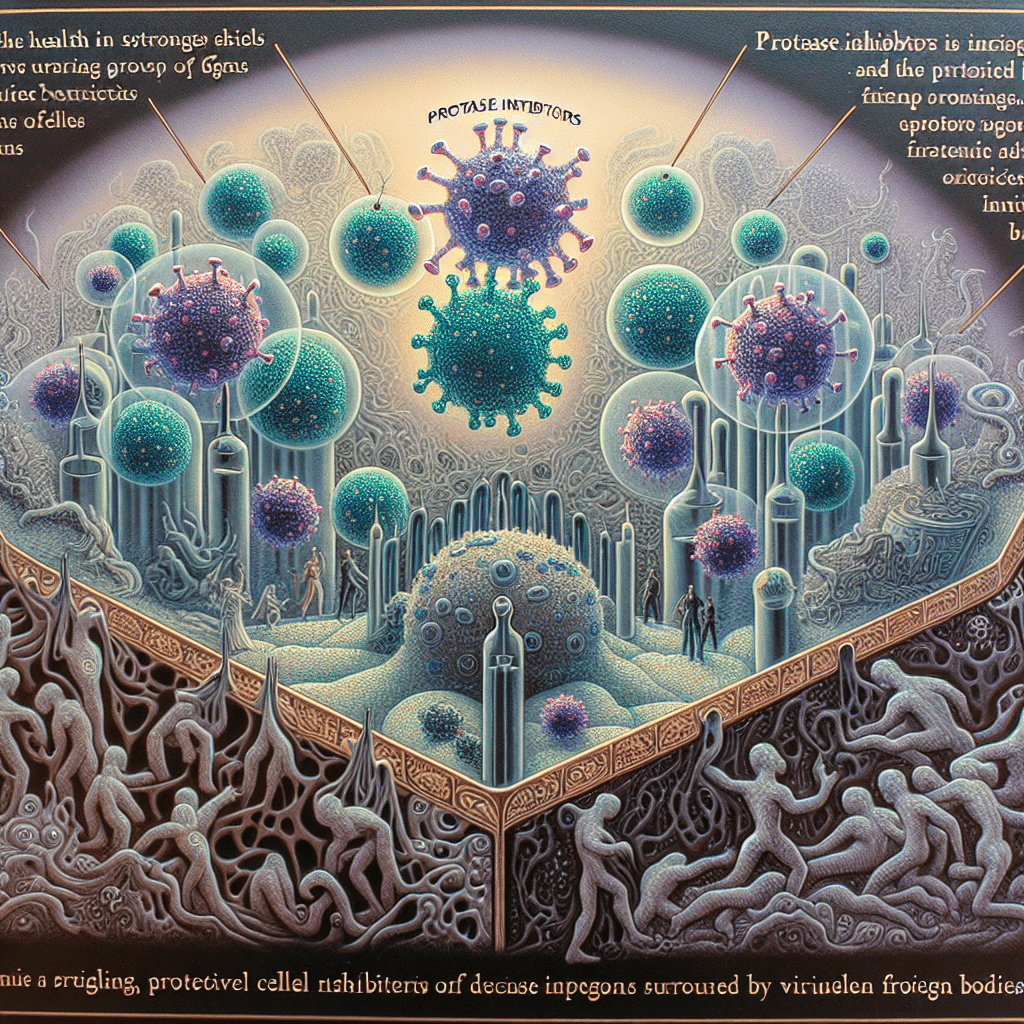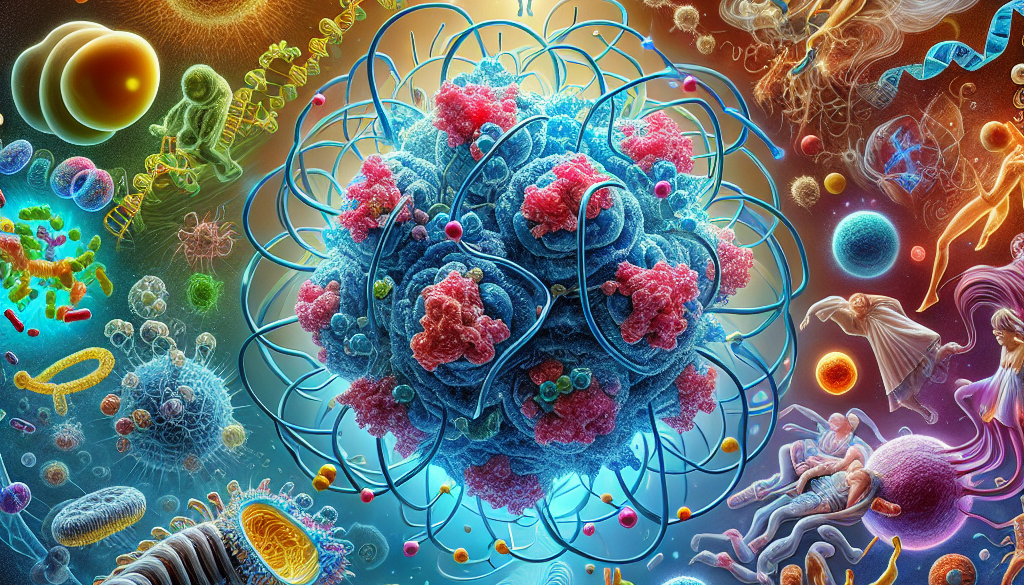Protease Inhibitors: Key Players in Health and Disease
-
Table of Contents
- Protease Inhibitors: Pivotal Agents in Health and Disease Management
- Understanding Protease Inhibitors
- Types of Protease Inhibitors
- Protease Inhibitors in Disease Treatment
- HIV/AIDS and Protease Inhibitors
- Cancer and Protease Inhibitors
- Protease Inhibitors in Health Maintenance
- Cardiovascular Health
- Immune System Regulation
- Challenges and Future Directions
- Case Studies and Statistics
- Conclusion: The Significance of Protease Inhibitors
- Discover ETprotein’s High-Quality Protein Products
Protease Inhibitors: Pivotal Agents in Health and Disease Management

Protease inhibitors are a class of compounds that play a crucial role in the regulation of various biological processes. These molecules have garnered significant attention in both clinical and research settings due to their ability to modulate protease activity, which is essential for maintaining homeostasis within the body. Protease inhibitors have been implicated in the treatment of diseases, including HIV/AIDS and certain cancers, and are also involved in managing other health conditions. This article delves into the importance of protease inhibitors, their mechanisms of action, and their applications in health and disease.
Understanding Protease Inhibitors
Proteases are enzymes that break down proteins by cleaving peptide bonds. While proteases are vital for normal cellular functions, such as digestion, wound healing, and the immune response, their unregulated activity can lead to pathological conditions. Protease inhibitors are molecules that bind to proteases and inhibit their activity, thus preventing the breakdown of proteins and peptides.
Types of Protease Inhibitors
- Synthetic Protease Inhibitors: These are chemically engineered compounds designed to target specific proteases.
- Natural Protease Inhibitors: Found in various organisms, these inhibitors often serve as defense mechanisms against predators or pathogens.
- Pharmaceutical Protease Inhibitors: These are drugs developed to treat diseases by inhibiting protease activity in pathological processes.
Protease Inhibitors in Disease Treatment
Protease inhibitors have revolutionized the treatment of several diseases, most notably HIV/AIDS and certain types of cancer. By targeting the proteases that are essential for the life cycle of pathogens or the progression of diseases, these inhibitors can effectively halt disease progression.
HIV/AIDS and Protease Inhibitors
The introduction of protease inhibitors in the mid-1990s marked a turning point in the treatment of HIV/AIDS. These drugs inhibit the HIV-1 protease enzyme, which is crucial for the maturation of infectious virus particles. By preventing the cleavage of viral polyproteins, protease inhibitors disrupt the replication cycle of HIV, leading to a significant reduction in viral load and an increase in CD4+ T-cell counts in patients.
Cancer and Protease Inhibitors
In the context of cancer, protease inhibitors target enzymes that cancer cells use to invade and metastasize. For example, the protease urokinase plasminogen activator (uPA) is often overexpressed in tumors and is associated with poor prognosis. Inhibitors of uPA can potentially reduce tumor growth and metastasis, offering a therapeutic strategy for cancer treatment.
Protease Inhibitors in Health Maintenance
Beyond their use in disease treatment, protease inhibitors also play a role in maintaining general health. They are involved in regulating blood pressure, modulating the immune response, and preventing the degradation of endogenous proteins that are essential for normal bodily functions.
Cardiovascular Health
Protease inhibitors such as angiotensin-converting enzyme (ACE) inhibitors are widely used to treat hypertension and heart failure. By inhibiting the conversion of angiotensin I to angiotensin II, a potent vasoconstrictor, ACE inhibitors help to lower blood pressure and reduce the workload on the heart.
Immune System Regulation
Protease inhibitors can modulate the immune system by affecting the activity of proteases involved in immune cell signaling and inflammation. For instance, inhibitors of the protease calpain have been shown to have immunomodulatory effects that could be beneficial in autoimmune diseases.
Challenges and Future Directions
Despite their therapeutic potential, the use of protease inhibitors is not without challenges. Issues such as drug resistance, side effects, and the need for better specificity are areas of ongoing research. The development of next-generation protease inhibitors that are more selective and have fewer adverse effects is a key focus in the pharmaceutical industry.
Case Studies and Statistics
Case studies have demonstrated the life-saving impact of protease inhibitors in HIV patients, with significant improvements in life expectancy and quality of life. Statistics show that the introduction of protease inhibitors has contributed to a decline in AIDS-related deaths by over 80% since their introduction.
Conclusion: The Significance of Protease Inhibitors
Protease inhibitors are indispensable tools in the fight against various diseases and in the maintenance of overall health. Their ability to precisely target specific proteases has led to breakthroughs in the treatment of life-threatening conditions such as HIV/AIDS and cancer. As research continues to evolve, the development of new and improved protease inhibitors holds promise for even more effective treatments in the future.
Discover ETprotein’s High-Quality Protein Products
If you’re looking for premium protein products, ETprotein offers an extensive range of organic and plant-based proteins that cater to various industries. Their commitment to quality, non-GMO, and allergen-free products makes them a top choice for your protein needs.
About ETprotein:
ETprotein, a reputable protein Chinese factory manufacturer and supplier, is renowned for producing, stocking, exporting, and delivering the highest quality organic bulk vegan protein and plant proteins. They include Organic rice protein, clear rice protein, pea protein, clear pea protein, pumpkin seed protein, sunflower seed protein, mung bean protein, peanut protein etc. Their offerings, characterized by a neutral taste, non-GMO, allergen-free attributes, cater to a diverse range of industries. They serve nutraceutical, pharmaceutical, cosmeceutical, veterinary, as well as food and beverage finished product distributors, traders, and manufacturers across Europe, USA, Canada, Australia, Thailand, Japan, Korea, Brazil, and Chile, among others.
ETprotein specialization includes exporting and delivering tailor-made protein powder and finished nutritional supplements. Their extensive product range covers sectors like Food and Beverage, Sports Nutrition, Weight Management, Dietary Supplements, Health and Wellness Products, and Infant Formula, ensuring comprehensive solutions to meet all your protein needs.
As a trusted company by leading global food and beverage brands and Fortune 500 companies, ETprotein reinforces China’s reputation in the global arena. For more information or to sample their products, please contact them and email sales(at)ETprotein.com today.














